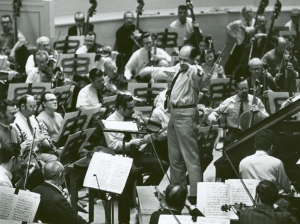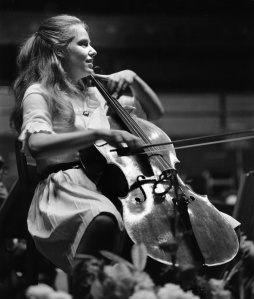As we look forward to celebrating Helen Regenstein Conductor Emeritus Pierre Boulez‘s ninetieth birthday in March 2015, we look back at his extraordinary relationship with the Chicago Symphony Orchestra, which began in February 1969.
Boulez’s first conducting appearances were greatly anticipated. His book Notes of an Apprenticeship had recently been published in English, and the Orchestra would be performing his music—the U.S. premiere of Livre pour cordes (two movements from his Livre pour quatuor from 1948, reworked in 1968 for string orchestra)—for the first time. The concerts also included the CSO debut of cellist Jacqueline du Pré and the CSO subscription concert debut of her husband, pianist Daniel Barenboim. (Barenboim first appeared with the Orchestra at the Ravinia Festival on June 24, 1965, in Beethoven’s First Piano Concerto with André Previn conducting.) The complete programs were as follows:
February 20, 21 & 22, 1969
DEBUSSY Jeux
BARTÓK Piano Concerto No. 1
Daniel Barenboim, piano
WEBERN Passacaglia, Op. 1
WEBERN Six Pieces for Orchestra, Op. 6
MESSIAEN Et exspecto resurrectionem mortuorum
February 27 & 28, 1969
HAYDN Symphony No. 91 in E-flat Major
SCHUMANN Cello Concerto in A Minor, Op. 129
Jacqueline du Pré, cello
BOULEZ Livre pour cordes
BERG Three Pieces for Orchestra, Op. 6
In the Chicago Tribune, Peter Gorner wrote: “If Diogenes [the cynic] could have made it to Orchestra Hall last night, he would have blown out his lantern and became a believer. For there have existed few composers more honest than Debussy, Bartók, Webern, and [Boulez’s teacher at the Paris Conservatory] Olivier Messiaen. And there are few interpreters more honest than Pierre Boulez. Honesty depends upon conviction, and Boulez firmly believes in the classics of our century. He also is immensely qualified to spread the word, possessing a composer’s mind, a conductor’s savvy, and a poet’s soul.”
On Barenboim, Gorner continued: “The Bartók was his flashy First Piano Concerto, with the ubiquitous Daniel Barenboim as soloist, and a magnificent one at that. His technique made the concerto sound easier than it is, and he conjured the steely touch and native awareness of cumulative energy to make it work. The colloquy between percussion and piano in the andante which followed sounded flawless.”
In his review for the Daily News of the second week’s program, Bernard Jacobson wrote: “Boulez has emphasized that in its new form [Livre pour cordes] is far more than a mere arrangement of the original—it is a full-scale recomposition, tackling the same musical problems but in terms of an entirely different medium. The result is music of formidable textural complexity, great sonorous variety, and powerful dramatic impact. . . . Yet Boulez’s characteristic intellectual control has ensured that the myriad events cohere in a rigorous organization of immediately perceptible unity.”
And in the Tribune regarding the “immensely gifted young cellist Jacqueline du Pré,” Thomas Willis added: “[she] plays for keeps all the time. Each note has maximum persuasive power. There is a total commitment of both physiological and musical resources. The melodic line is maximally weighted. When she is not playing, she is often reacting to the orchestral dialog—so much a part of the Schumann concerto.”

Pierre Boulez rehearsing Daniel Barenboim and the Chicago Symphony Orchestra in Bartók’s First Piano Concerto in February 1969
Numerous upcoming programs celebrate Pierre Boulez, including Beyond the Score: A Pierre Dream on November 14 and 16, 2014, and Boulez’s Piano Works on March 15, 2015, with Pierre-Laurent Aimard and Tamara Stefanovich.




3 comments
Comments feed for this article
March 14, 2022 at 10:29 AM
Happy 90th birthday, Pierre Boulez! | from the archives
[…] the Chicago Symphony Orchestra and Chorus, a timeline of his extensive partnership with the CSO, details of his debut with the CSO in 1969, and a select bibliography. A video of the world-premiere performances of the Beyond the Score […]
February 22, 2022 at 2:37 PM
Remembering Jacqueline du Pré | from the archives
[…] February 1969, Pierre Boulez made his first guest conducting appearances with the Chicago Symphony Orchestra. The first week included Daniel Barenboim’s subscription concert debut as piano soloist, and […]
December 18, 2014 at 10:00 AM
Congratulations to Grammy Lifetime Achievement Award recipient Pierre Boulez! | from the archives
[…] the Chicago Symphony Orchestra and Chorus, a timeline of his extensive partnership with the CSO, details of his debut with the CSO in 1969, and a select […]